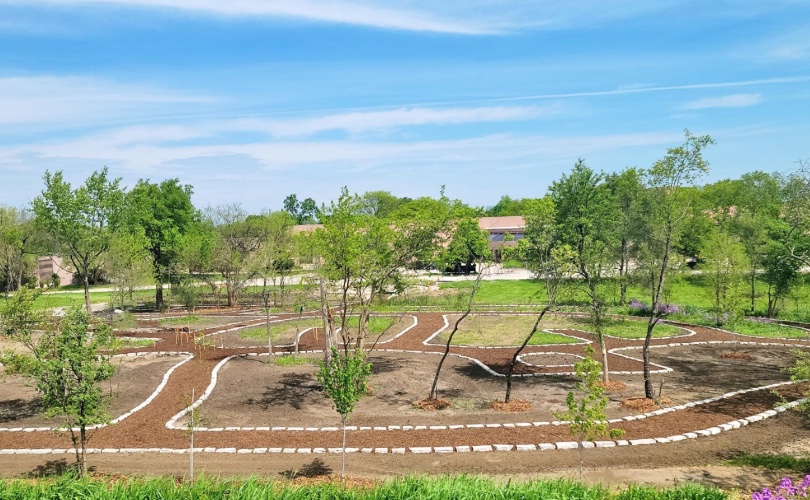
CHICAGO (LifeSiteNews) — The Archdiocese of Chicago has unveiled the first “eco-friendly” burial options in one of its cemeteries, citing a “reflection of a growing environmental consciousness among Americans.”
Late last week, the Catholic Archdiocese of Chicago announced the introduction of a “natural burial option” which will offer “eco-friendly interments.”
“We are honored to offer a new natural burial option that not only respects the environment but also aligns with Catholic teachings for treating the human body with dignity,” announced Ted Ratajczyk, executive director of Catholic Cemeteries of the Archdiocese of Chicago. “This initiative reflects our commitment to providing choices that honor the dignity of life, the needs of our community and the values of our faith,” he said.
Catholic Cemeteries Chicago writes on its website that “natural burials forego harsh embalming fluids, traditional caskets, and outer burial containers in favor of biodegradable materials, organic fibers, and eco-friendly embalming techniques. This minimizes environmental impact while honoring the natural cycle of life and death.”
The purportedly “eco-friendly” interment will provide “families with new and meaningful ways to honor their loved ones,” the archdiocese stated, adding that it was the first Catholic diocese in the state of Illinois to offer such an option.
The “eco-friendly” burial plots will be situated an acre of land the archdiocese has specially set aside in the Meadows of St. Kateri, at the cemetery of St. Michael the Archangel in Palatine.
Announcing the specially designated plot, the archdiocese stated that the area “will offer a sacred and beautiful space for quiet reflection and connection with nature for families to visit and remember their loved ones.”
“The peaceful setting will feature winding walking trails, native plants and a mixture of meadow and forest terrain,” the archdiocese added.
So called “natural” or “green” burials are becoming increasingly popular in secular society, and now finding traction even within members of the Catholic Church. The Archdiocese of Chicago described the process as being one which would “emphasize simplicity and environmental responsibility by allowing the body to return to the earth naturally.”
‘Return to tradition’
“The practice,” Cardinal Cupich’s archdiocese added, “aligns with Catholic teachings on the sanctity of life and respect for the environment and honors the Catholic faith in the Resurrection – the cycle of death and rebirth.”
Describing a “natural” burial as “a return to tradition,” the cemeteries group has said that the “Catholic Church permits natural burial, as it aligns with traditional Catholic burial practices and has been the norm for most of human history. The Church encourages respectful treatment of the body and burial on sacred consecrated grounds.”
Instead of using a standing headstone for each grave, a natural grave would utilize a “flush lawn-level memorial, an engraved boulder, or a boulder with a bronze nameplate.”
Rather than a formal graveyard with graves positioned in measured distances, the Meadows of St. Kateri site will represent a field, full of natural plant and wildlife growth: “Our natural burial grounds offer a beautiful area for quiet reflection and connection with nature. The peaceful setting features winding walking trails, native plants, and a mixture of meadow and forest terrain.”
READ: Rhode Island House passes ‘human composting’ bill despite numerous objections
The Archdiocese of Chicago further explained its new move by referencing a “growing environmental consciousness among Americans.”
Citing a 2023 report from the “National Funeral Directors Association,” the archdiocese quoted from the report summary to state that “60% would be interested in exploring ‘green’ funeral options because of their potential environmental benefits and cost savings, up from 55.7% in 2021.”
Growing trend
Chicago’s suggestion of “green” burials is not new among U.S. Catholic dioceses. In 2021, then local ordinary Archbishop Michael Jackels of Dubuque recommended Catholics use less “offensive” methods in burying the dead.
Criticizing both burial and cremation for supposedly not being ecologically friendly, Jackels recommended liquefying a corpse. This would involve combining “hot water, lye, air pressure and circulation” to “liquify a corpse in a matter of hours, which can then be safely poured in the ground.”
He also suggested “recompositing,” or recomposing, a method whereby the body “is placed in a container, covered with wood chips, straw and alfalfa, using heat to kill contagions and air flow for decomposition. After a month, it results in soil.”
Jackels defended the controversial move, saying “the Church only asks that the body be treated with respect, and be laid to rest in a place blessed by clergy, whether in the earth, water, fire, or air, cemetery or not.” In a statement issued last year, titled “On the Proper Disposition of Bodily Remains,” the U.S. Conference of Catholic Bishops (USCCB) condemned the destruction of deceased human bodies through composting.
Currently, 12 U.S. states – including Washington, Colorado, Oregon, Vermont, California, New York, Nevada, Arizona, Maryland, Delaware, Minnesota, and Maine – have legalized the practice of compositing the deceased.
Catholic stance
In 2016, the Congregation for the Doctrine of the Faith’s (CDF) document Ad resurgendum cum Christo continued the move away from the Church’s traditional condemnation of cremation, which has spread since the early 1960s.
However, it continued to stipulate that the Church “insistently recommends that the bodies of the deceased be buried in cemeteries or other sacred places,” with a traditional burial being the “most fitting way to express faith and hope in the resurrection of the body.”
The Church “cannot, therefore, condone attitudes or permit rites that involve erroneous ideas about death, such as considering death as the definitive annihilation of the person, or the moment of fusion with Mother Nature or the universe, or as a stage in the cycle of regeneration, or as the definitive liberation from the ‘prison’ of the body,” the CDF declared.

